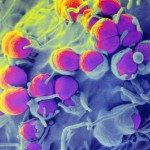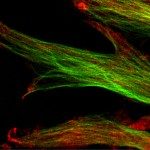Lien vers Pubmed [PMID] – 15695409
Cancer Res. 2005 Jan;65(2):641-9
High-risk human papillomaviruses (HPV) such as HPV16 are associated with the development of cervical cancer. The HPV16-E6 and HPV16-E7 oncoproteins are expressed throughout the replicative cycle of the virus and are necessary for the onset and maintenance of malignant transformation. Both these tumor-specific antigens are considered as potential targets for specific CTL-mediated immunotherapy. The adenylate cyclase (CyaA) of Bordetella pertussis is able to target dendritic cells through specific interaction with the alpha(M)beta(2) integrin. It has been previously shown that this bacterial protein could be used to deliver CD4(+) and CD8(+) T cell epitopes to the MHC class II and class I presentation pathways to trigger specific Th and CTL responses in vivo, providing protection against subsequent viral or tumoral challenge. Here, we constructed recombinant CyaA containing either the full sequence or various subfragments from the HPV16-E7 protein. We show that, when injected to C57BL/6 mice in absence of any adjuvant, these HPV16-recombinant CyaAs are able to induce specific Th1 and CTL responses. Furthermore, when injected into mice grafted with HPV16-E7-expressing tumor cells (TC-1), one of these recombinant proteins was able to trigger complete tumor regression in 100% of the animals tested. This therapeutic efficacy compared favorably to that of strongly adjuvanted peptide and was marginally affected by prior immunity to CyaA protein. This study represents the first in vivo demonstration of the antitumoral therapeutic activity of recombinant CyaA proteins carrying human tumor-associated antigens and paves the way for the testing of this vector in clinical trials.

